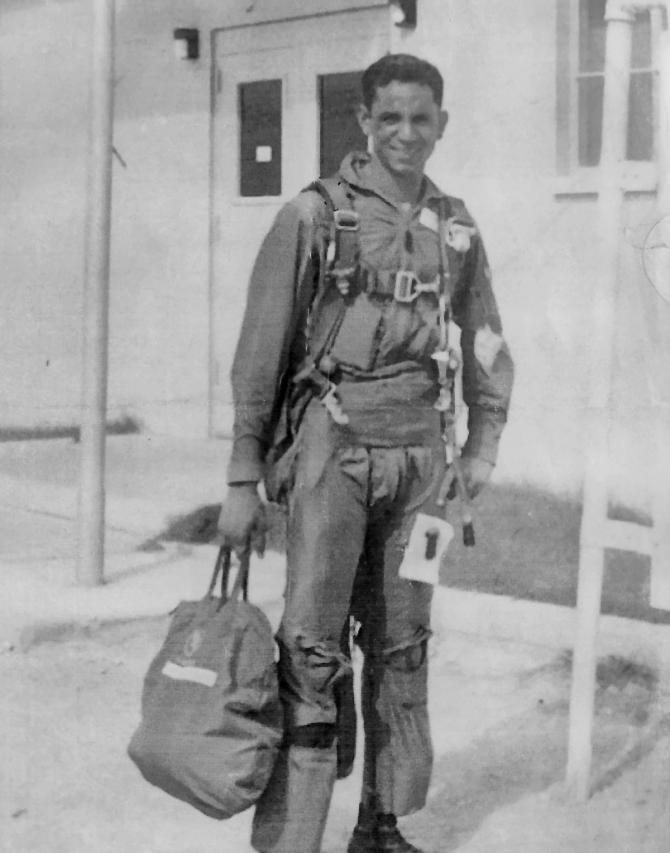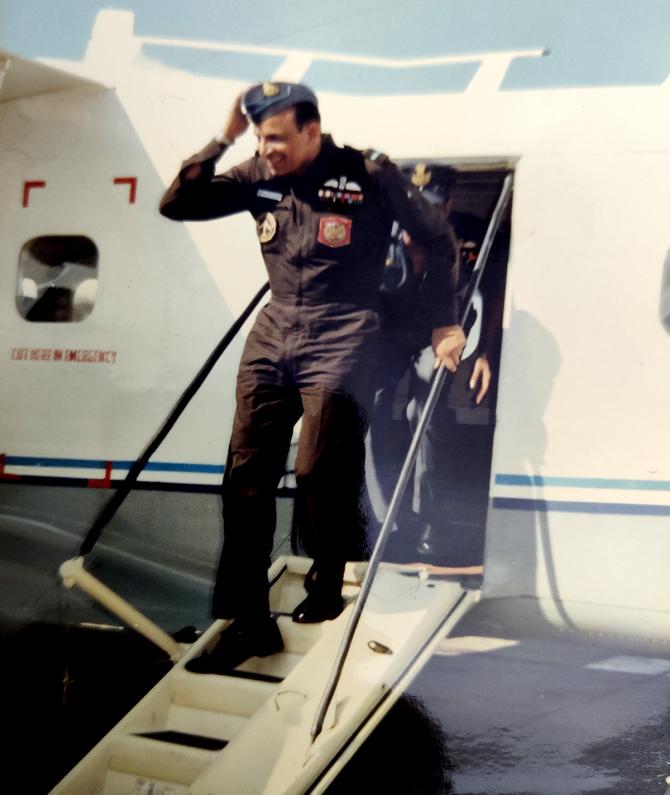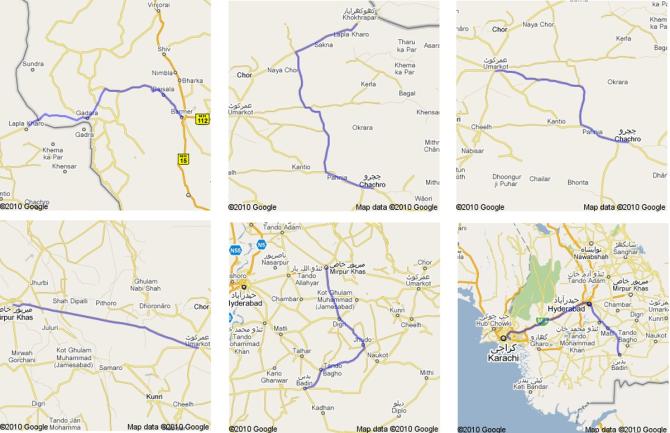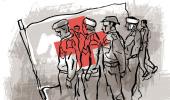'I was bundled into a blanket and shoved into a small hut for the night.
'I heard the Pakistani Rangers telling the snoopy villagers that I was a senior officer in custody and wasn't to be disturbed.'
Later, Flying Officer Jawahar Lal Bhargava discovered the reason; the Rangers were taking no chances since the area they had camped in for the night had a sizeable Hindu population.

He was part of the 225 Squadron.
The 1971 war between India and Pakistan had begun.
Jawahar Lal Bhargava was flying his first sortie over enemy territory.
Before he knew it, an unexpected attack from the Pakistani side badly damaged his aircraft. He was forced to eject as his aircraft went down in flames.
Bhargava walked away from the crash site towards what, he hoped, was the Indian border. Instead, he was walking deeper into Pakistan.
Discovered by some villagers, he convinced them he was a pilot in the Pakistan Air Force. While they believed him, the village school headmaster was suspicious. He called in the Pakistani Rangers and, soon, Bhargava's identity was discovered.
In part IV of this fascinating tale, he tells IAF Veteran Air Commodore Nitin Sathe what happened next.
- Part I: Captured in Pakistan
- Part II: 'I have been hit'
- Part III: 'You can kill me if you want'
Air Commodore Jawahar Lal Bhargava pauses his gripping story. We return from 1971 to 2022 as Bhargava Sir sips from a glass of water.
He smiles, "There are many stories about my year-long stay in Pakistani jails which I shall re-count in my biography that I plan to write soon. Let me give you a taste of some of them today!"
We are back in 1971 and the Pakistani Rangers are readying to take their prisoner to his next destination. It would be a long ride on camels.
"These guys didn't even have handcuffs and blindfolds. I had two large handkerchiefs on me -- a habit I have even now -- and these were used to tie my hands together and blindfold me.
"The worst bit, however, was the journey. The constant gyrations caused by the camel's movements without any visual reference, since I was blindfolded, made my stomach churn and led to spatial disorientation. I especially hated the times the camel was made to sit down -- of course it had to stand up later which was just as bad -- during halts."
Once a while, when they heard IAF planes overhead, Bhargava would promptly advise the entourage to hide. "I didn't want to be shot by my friends!" he grins.
Some of the Rangers were not friendly and frequently needled him with questions about who he really was.
'Civil dress kyon pehna hai?(Why are you wearing a civil dress?)', they asked repeatedly.
Bhargava Sir had a hard time convincing them he was really a downed pilot and not a spy.
He showed them the Identity Disc around his neck to prove that he was indeed an IAF pilot.
'Dalle nu maar goli! (Kill the bloody pimp!)' said an infuriated Ranger, as they set course once again on the camels.
"Their leader, Awaz Ali, saved my life. He pacified his men and prevented them from shooting me. For the first few hours after we left the village however, I was in constant fear of a bullet hitting me from behind."
Enroute, they stopped at a Pakistani army camp where a very pleasant captain offered Bhargava Sir tea and biscuits.
"I complained to him that the Rangers had threatened to shoot me."
'We have been looking for you,' the captain replied reassuringly. 'You are now in safe hands. You will be handed over to the Pakistani army authorities tomorrow!'
On the way to Chachro (in Sindh, Pakistan) later the same day, we neared a small village. One of my escorts asked me if I needed a water break.
I was in no mood to go through the motions of the camel sitting down and getting up so I refused, saying we should move on.
A Ranger, however, wanted a halt so halt they did.
It was late in the evening and I heard them speaking with the villagers rather loudly.
One of the villagers was telling them, 'Chachro Hindustani fauj le gayi hai(Chachro has been taken over by the Indian forces)'
'Yeh kaisa ho sakta hai?! (How is this possible?!)', exclaimed the leader of the group of Rangers.
This news put a spanner in their works and they began discussing what they should do next.

Chachro had indeed been taken by the brave soldiers of the 10 Para (also known as the Desert Scorpions since they are trained for desert warfare).
Their commanding officer, then Lieutenant Colonel Bhawani Singh -- the maharaja of Jaipur -- had led his troops in one of the most daring and stealthy surgical strikes of the war and taken over the Pakistani positions without losing a single man.
Their plan to proceed further was abandoned; the Rangers and I stayed at the village that night.
"One thought constantly played in my mind -- what if we hadn't stopped for a break! The captors would have been taken captive, my camel ride would have ended and I would have been a free man!"
"Oh, that camel! How I had started hating it!! I had only one prayer since the camel journey began -- that this torturous ride would end soon."
Finally, it was.
'I was bundled into a blanket and shoved into a small hut for the night.
"I heard the Rangers telling the snoopy villagers that I was a senior officer in custody and wasn't to be disturbed.
Later, Bhargava Sir came to know the reason; the Rangers were taking no chances since the area they camped in for the night had a sizeable Hindu population.
Bhargava Sir's journey began at Bhitala (in Sindh, Pakistan) near the crash site and continued through the towns of Chachro, Umarkot (both in Sindh, Pakistan), Mirpur (in Pakistan occupied Kashmir) and Badin (in Sindh, Pakistan) before going to the big city of Karachi and ending up at Rawalpindi.
This table explains his journey.
| S NO | DATE | FROM | TO | MODE OF TRANSPORT | REMARKS |
| 1. | December 5 | Bhilata | Chachro | Camel back | From the crash site |
| 2. | December 6 | Chachro | Umarkot | Open one tonner | |
| 3. | December7-8 | Umarkot | Mirpur Khas | Jeep | |
| 4. | December 9 | Mirpur Khas | Badin | Jeep | |
| 5. | December 10 | Badin | Karachi | Jeep | At Drigh Road |
| 6. | December 11 | Karachi | Rawalpindi | PAF Propeller Aircraft | POW Camp |
The map below shows his approximate estimated route through this sojourn.

Air Commodore Nitin Sathe retired from the Indian Air Force in February 2020 after a distinguished 35 year career.
The author of three books, you can read Air Commodore Sathe's earlier articles here.
Feature Presentation: Rajesh Alva/Rediff.com











 © 2025
© 2025